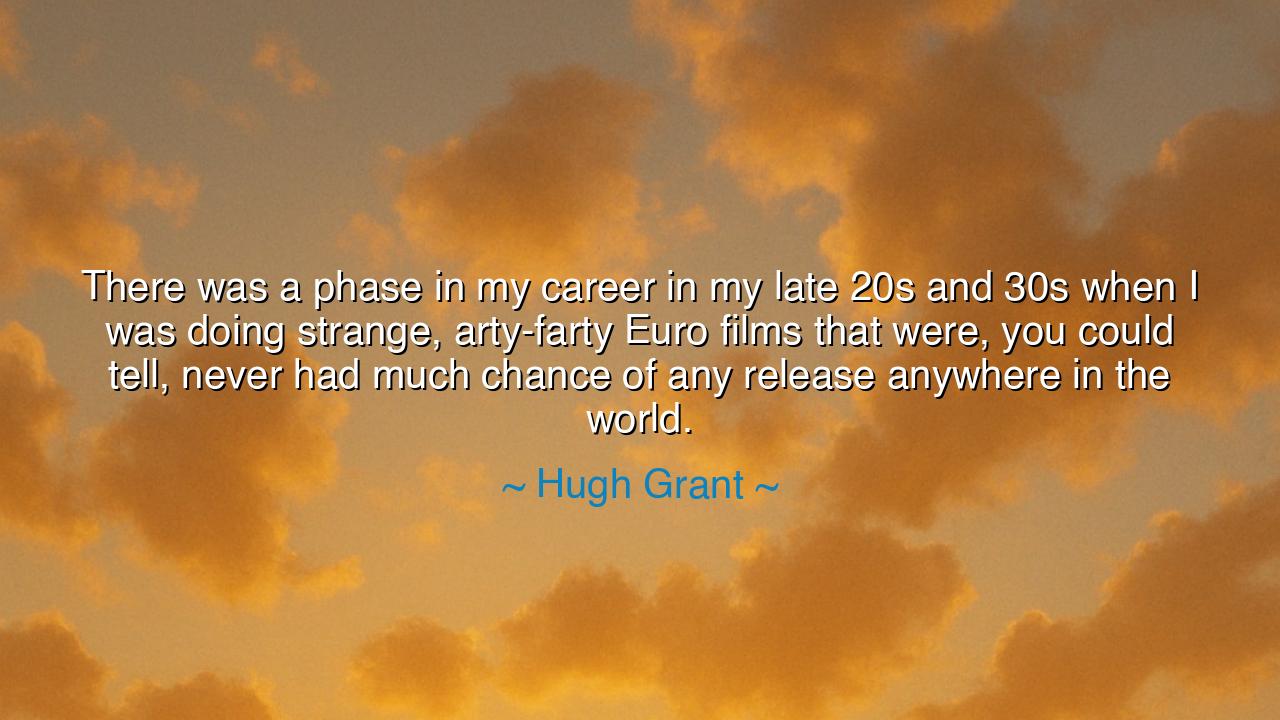
There was a phase in my career in my late 20s and 30s when I was
There was a phase in my career in my late 20s and 30s when I was doing strange, arty-farty Euro films that were, you could tell, never had much chance of any release anywhere in the world.






In the words of Hugh Grant, "There was a phase in my career in my late 20s and 30s when I was doing strange, arty-farty Euro films that were, you could tell, never had much chance of any release anywhere in the world," we hear a reflection on the journey of an artist—a journey marked not just by success, but by the uncertainty and experimentation that often precede it. Grant speaks of a time when his career was in flux, a phase where he pursued films that were perhaps more about artistic expression than commercial success. His words reveal a truth that many artists know: the path to greatness is not always straight, and sometimes, the choices we make may not lead to immediate recognition or validation. Instead, they are about exploring and discovering one's true voice, even if it means walking paths that seem uncertain.
The early phases of an artist’s career are often filled with moments of self-doubt and experimentation, where the pursuit of personal expression may not always align with popular opinion or commercial success. Like many great artists before him, Grant’s early work reflects a period of creative exploration—a time when he was not yet certain of the path he would eventually take. In ancient Greece, Sophocles and Euripides were not immediately successful in their plays; their early works were often met with mixed reviews, but they continued to write and experiment, eventually shaping the foundations of Western theater. Similarly, Grant’s early films were stepping stones, even if they were not destined for wide recognition. Artistry requires the courage to take risks, to dive into projects that may not fit into the conventional mold, trusting that each experience will bring deeper understanding and growth.
Grant’s acknowledgment that these films "never had much chance of any release anywhere in the world" also speaks to the persistence and resilience required to be an artist. Failure or lack of immediate recognition does not mean defeat; rather, it is an essential part of the process. The great painters of the Renaissance, like Michelangelo and Leonardo da Vinci, faced similar struggles. Their works were not always celebrated in their time, and their early years were filled with frustration and rejection. Yet they continued to refine their craft, learning from each failure, each brushstroke, and ultimately, they became the legends we remember today. Similarly, Grant’s phase of doing experimental films was not in vain; it was part of the process that shaped him into the actor we now know, one who would later rise to international fame. His experience reminds us that success is not about avoiding failure, but about learning from it, adapting, and persevering.
The pursuit of art and expression often comes with a price—sacrifice and uncertainty. Like Grant, many artists must endure a period where they are unsure of the outcome, where the fruits of their labor are not guaranteed to be recognized. The ancient artist Phidias, who created the statue of Athena Parthenos, did not know if his work would be appreciated by future generations. Yet he poured his soul into his creations, and today, his sculptures are considered among the greatest of all time. This act of creating without the guarantee of success requires faith—faith that the process itself is worthwhile, and that the contribution to the greater tapestry of human culture will eventually be recognized, if not in one’s lifetime, then in the years to come. The creative journey is one that demands dedication and passion, even when the results seem distant or uncertain.
Grant’s reflection also touches upon the idea of self-discovery. Through his early, less commercial work, he was searching for his own artistic voice, exploring what he truly wanted to express and how he wished to be seen in the world. In a way, this phase was about finding himself, just as Homer’s Iliad was a work that captured both the human condition and the search for purpose. For Grant, those early years were necessary for his growth as an actor, just as the trials and challenges of life are necessary for all of us to discover our true selves. The act of experimenting with roles that didn’t fit into conventional expectations gave him the space to refine his craft and build the foundation for his later successes.
The lesson from Hugh Grant’s words is both clear and deeply resonant: success is not always immediate, nor is it guaranteed. It is often a product of risk, failure, and self-reflection. The path to greatness is not paved with easy victories but is built upon experiments and discoveries that shape an individual into the person they are meant to become. Just as Grant found his stride through a mix of “strange” roles, we too must embrace the unknown, take chances, and trust in the process. Failure is not an end but an essential part of the journey, and each setback is an opportunity to learn and grow.
In our own lives, whether in our careers, relationships, or personal pursuits, we must remember the importance of embracing experimentation and resilience. Like Hugh Grant and the great artists before him, we should be willing to step into the unknown, to pursue what feels true to us, even when the road is uncertain. For it is only by pushing the boundaries, by taking risks, and by continuing to evolve, that we create a life of purpose and fulfillment. Let us all dare to take chances, knowing that each step we take, no matter how uncertain, is a step toward discovering our true potential.






AAdministratorAdministrator
Welcome, honored guests. Please leave a comment, we will respond soon